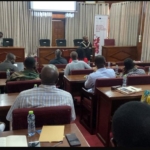
Campaigners against anti-corruption have intensified demands for specialized courts and tailored-resourced judges to trial cases of corruption and mismanagement of public resources.
Previous efforts, including the 2015 to 2024 National Anti-Corruption Action Plan, failed to achieve results as agencies working in silos with slim resources.
The launch of the 2026 to 2030 National Ethics and Anti-Corruption Action Plan is set to take a sharper turn with more punitive approach and resources.
A regional stakeholder’s engagement on the formulation of the National Ethics and Anti-Corruption Action Plan (NEACAP 2026-2030) highlights a new plan mandating close collaboration and seamless transfer of cases among anti-corruption institutions.
Calls for specialized approach to corruption fight with specialized anti-corruption courts, high institutional resources and trained with technical expertise for judges, was the peak of discussions.
Chair Of the African Union Advisory Board Against Corruption, Edem Senanu, insists the public must begin to see decisive results on corruption cases within six months, if specialized courts are instituted.
“The previous one (National Anti-Corruption Action Plan) lacked strong collaboration, having many of anti-corruption agencies working independently. This new report (National Ethics and Anti-Corruption Action Plan) will require interconnected approach where cases will be passed on to relevant body to handle.
“The funding for agencies was not much to facilitate to fight against corruption. We want to see results to corruption cases in six months. And so we need anti-corruption specialized courts, where judges’ know-how or are experts in the subject matter. Anti-corruption fight should be specialized,” he said.
The National Anti-Corruption Action Plan (NACAP 2015-2024) concluded its implementation cycle in 2024.
The continuity of the efforts has influenced the setup of a task force to develop a new anti-corruption framework for the next five years.
The engagement constituted a working group including representatives from Government Institutions, Civil Society Organizations, the Judiciary, and subject-matter experts.
Edem Senanu justified the emphasis of ethics in the new action plan.
“In every successful jurisdiction, the set of values and ethics are very clear; hard work, honesty and integrity ingrained in the lives of the citizens but in Ghana, shortcut is the way to go about things. So, we need a fundamental shift. In this National Ethics and Anti-corruption Action Plan, there is emphasis on ethics.
“We are looking to identify where corruption have been happening, identify the people involved, arrest them. There are few things we are looking at to make the issue of values stronger. We are all coming on board and make it more successful,” he said.
National Commission for Civic Education, Baah Paul decried the whistle blowing infractions, hampering corruption fight.
“The solution is collective. But there is a need for a robust protection for people. People who do the country favor by exposing corruption should not be victimized or have their peace of mind, and even life taken because of it,” he said.




